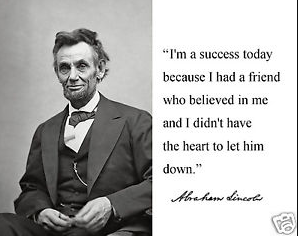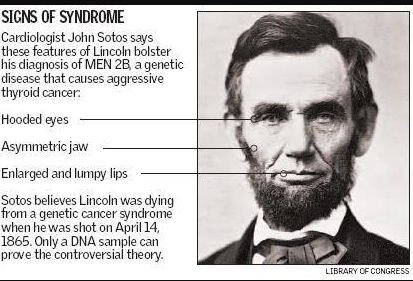What Is Abraham Lincoln’s Secret?
Ablincoln Disease is everybody knows Abraham Lincoln, the 16th President of the United States, either for his political triumph, his remarkable achievements against slavery, or, last but not least, his cruel assassination. What most people are not aware of is that President Lincoln had an extremely rare genetic disorder called Sotos syndrome.

What is Ablincoln Disease? How does one get it?
Sotos Syndrome is the result of an alteration in a gene located at chromosome 5 called NSD1, which is responsible for DNA regulation through methylation process. The NSD1 protein is a methyl-transferase and acts as an enzyme regulating growth and development.
With an incidence of 1 in 14.000 live births, family history of an autosomal dominant pattern, meaning that the inheritance of just one copy of the gene from a parent will lead to the phenotype of the disorder, is detected only in 5% of the cases. In the rest 95% there is total absence of family history and is caused by a new random mutation, the most probable scenario for Abraham Lincoln.
What is the difference in people who have it?
The syndrome makes its presence with fast growing and advanced bone age from early infancy and is easier identified in childhood, when growth is at its peak.
Although adult height is normal, children with Sotos, grow faster, are much taller than their siblings, have bigger skulls and dysmorphic faces.
In Abraham Lincoln’s example we can note the presence of a long narrow face with big forehead and stretch of the rest bone and cartilage facial structures such as the nose, ears, cheekbones and the long pointy chin.
Does it affect their character?
The syndrome has a wide range of possible behavioral and intellectual effects. People with Sotos are more prone to suffer from autism, ADHD, phobias, obsessions or impulsive behaviors.
In addition, muscle weakness and hypotonia may affect their motor skills and movement abilities. Several historic sources on Abraham Lincoln’s early ages describe him as an introvert person, passionate with lonely reading and thorough studying, not interested at all in hard labor work, sometimes even as “lazy”.

Is that all?
Unfortunately, sometime the syndrome may have much more threatening manifestations, with kidney and heart defects, seizures, blindness, loss of hearing, serious mental disability and cancer. Fortunately, none of the above were found in Abraham Lincoln.
Why is this story important?
People with syndromes affecting their appearance or way of thinking live everywhere around us. Sometimes they get laughed at just because of their distinctive looks, or not given enough time to be understood through their special, and maybe not so complex code.
Abraham Lincoln was lucky not only to have a mild form of the disorder but also to have a family and close friends that helped him nurture his genius forgetting minor character flaws and unusual habits. Sometimes labeling leads to racism.
We have to remember that everyone is unique, even If we can fit him in a smaller group of 1:14000, or any of this kind.
References
- Ball LJ, Sullivan MD, Dulany S, Stading K, Schaefer GB. Speech-language characteristics of children with Sotos syndrome. Am J Med Genet A. 2005 Aug 1;136A(4):363-7. Citation on PubMed: https://www.ncbi.nlm.nih.gov/pubmed/16001444
- Cecconi M, Forzano F, Milani D, Cavani S, Baldo C, Selicorni A, Pantaleoni C, Silengo M, Ferrero GB, Scarano G, Della Monica M, Fischetto R, Grammatico P, Majore S, Zampino G, Memo L, Cordisco EL, Neri G, Pierluigi M, Bricarelli FD, Grasso M, Faravelli F. Mutation analysis of the NSD1 gene in a group of 59 patients with congenital overgrowth. Am J Med Genet A. 2005 Apr 30;134(3): 247-53. Citation on PubMed: https://www.ncbi.nlm.nih.gov/pubmed/15742365
- GeneReview: Sotos Syndrome https://www.ncbi.nlm.nih.gov/books/NBK1479
- William Lee Miller (2002). Lincoln’s Virtues: An Ethical Biography (Vintage Books ed.). New York: Random House/Vintage Books ISBN 0-375-40158-X.
- Merrill D. Peterson (1995). Lincoln in American Memory. Oxford U.P. ISBN 978-0-19-988002-
